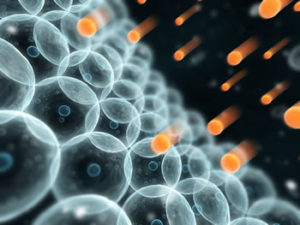
CoQ10 is found in nearly all the cells of the body, the highest levels being located in the cells of the heart.
CoQ10 packs a powerful anti-oxidant punch: as a fat soluble enzyme it works in combination with vitamin E protecting lipids (fats) in the blood, and protecting membranes from oxidative damage heart, liver and kidney. CoQ10 is essential for the cells of the heart, providing energy for the heart muscle to beat effectively. Trials are indicating the benefits of CoQ10 supplementation on the health and functioning of the cardiac muscle and cardiovascular system and improved outcomes when used before cardiac surgery (1,2,3,4).
The increasing number of patients taking cholesterol-reducing drugs know as ‘statins’ may do well to consider supplementing with CoQ10, as it appears that these drugs have the ability to reduce the production of CoQ10 in the body. Research undertaken in 2005 concluded “statin-related side effects, including statin cardiomyopathy, are far more common than previously published, and are reversible with the combination of statin discontinuation and supplemental CoQ10.
We saw no adverse consequences from statin discontinuation” (5). Despite research in 2007 which reported physicians should be aware of this drug-nutrient interaction and be vigilant to the possibility that statin drugs may, in some cases, impair skeletal muscle and myocardial bioenergetics (6), little progress seems to have been made in doctor and patient awareness. A small cross-over study reported in 2009 demonstrated that CoQ10 supplementation improved endothelial dysfunction and statin-related type 2 diabetic patents (7).
CoQ10 is showing benefits to oral health in the treatment of gum disease, both as a topical application and when taken as a supplement (8,9).
Research indicates that there are potential benefits when using CoQ10 in the treatment of Parkinson’s disease (10). The high level of oxidative stress that can occur in the brain means that the protective anti oxidant capacity of CoQ10 is being considered for a number of conditions, including Parkinson’s and Alzheimer’s disease.
The application of CoQ10 and its implications in health and disease appear wide ranging and are increasingly being discussed in a variety of health arenas, (11).
Various studies have shown benefits when used in breast cancer treatment, a study into prostate cancer found that, ‘CoQ10’ induced apoptosis (programmed cell death) and as such is viable anti-tumour agent and may be useful in controlling the progression of prostate cancer’, (12).
A further study carried out between 1997 and 2004 found that low plasma levels of CoQ10 were an independent prognostic factor for melanoma progression, (13).
It also appears that statins may not be the only medication to lower CoQ10 levels. Research in 2005 showed the patients with corticosteroid dependent asthma have low plasma CoQ10 levels: however, a reduction in the dosage of corticosteroids was possible by the patients following antioxidant supplementation with vitamin C and E, and CoQ10, (14).
References
1. C Morisco, B Trimarco, M Condorelli, “Effect of Coenzyme Q10 Therapy in Patients with Congestive Heart Failure: A Long-term Multicentre”. Journal of Molecular Medicine, 1993 Page 1. Clin Investig (1993) 71:S 134-S 136.
2. Mortensen SA, Vadhanavikit S, Baandrup R, Folkers K. “Long-term Coenzyme Q10 Therapy: A Major Advance in the Management of Resistant Myocardial Failure”. Drug Exptl Clin Res 1985;11:581-93.
3. Mortesen SA, Vadhanavikit S, Muratsu K, Folkers K. “Coenzyme Q10: Clinical Benefits with Biochemical Correlates Suggesting a Scientific Breakthrough in the Management of Chronic Heart Failure”. Int J Tissue React. 1990;12(3):155-62.
4. Franklin Rosenfeldt, MD, FRACS, Silvana Marasco, FRACS, William Lyon, MBBS, Michelle Wowk, BSc(Hons), Freya Sheeran, BA, BSc(Hons), Michael Bailey, MSc(Stats), Donald Esmore, FRACS, Bruce Davis, FRACS, Adrian Pick, FRACS, Mark Rabinov, PhD, FRACa, Julian Smith, MSurg, FRACS, Philip Nagley, PhD, DSc, Salvatore Pepe, PhD. “Coenzyme Q10 Therapy Before Cardiac Surgery Improves Mitochondrial Function and In Vitro Contractility of Myocardial Tissue”. Journal of Thoracic and Cardiovascular Surgery Vol 129 issue Jan 2005 pg 25-32.
5. Langsjoen PH, Langsjoen Jo, Langsjoen AM, Lucas LA. “Treatment of Statin Adverse Effects with Supplemental Coenzyme Q10 and Statin Drug Discontinuation”. Biofactors. 2005;25(1-4):147-52.
6. Littarru GP, Langsjoen P. “Coenxyme Q10 and Statins: Biochemical and Clinical Implications”. Mitochondrion. 2007 Jun; 7 Suppl: S168-74r.
7. Sandra J Hamilton, PGDipHealSc, Gerard T Chew, MD and Gerald F Watts, DSc. “CoEnzyme Q10 Improves Endothelial Dysfunction in Statin-Treated Type 2 Diabetic Patients”. Diabetes Care Published ahead of print, published online ahead of print, February 19 2009
www.care.diabetesjournals.org
8. T. Hanioko, M. Tanaka, M. Ojima, S. Shizukuishi, K. Folkers. “Effect of Topical Application of Coenzyme Q10 on Adult Periodontitis”. Molecular Aspects of Medicine Volume 15, Supplement 1, 1994, Pages s241-s248.
9. Theresa Matthews-Brzozowska, Anna Kurhañska-Flisykowska, Marzena Wyganowska, O Ewitkowska1, Janina Stopa. “Healing of Periodontal Tussue Assisted by Coenzyme Q10 with Vitamin E”. Clinical and Laboratory Evaluation. Pharmacological Reports 2007, 59, suppl 1.257- 260
10. Carine Cleren, Lichuan Yang, Beverly Lorenzo, Noel Y. Calingasan, Andrew Schomer, Anthony Sireci, Elizabeth J. Wille and M. Flint Beal “Therapeutic Effects of Coenzyme Q10 (CoQ10) and Reduced CoQ10 in the MPTP Model of Parkinsonism”. Journal of Neurochemistry 2008, 104 1613-1621.
11. Littarru, Gian Paolo, Tiano, Luca. “Clinical Aspects of Coenzyme Q10: an update”. Current Opinion in Clinical Nutrition and Metabolic Care. Nov. 2005 Vol 8. issue 6, P641-646.
12. I Persaud. NR Narain, KV Woan, KJ Russell. “Coenzyme Q10 Induces Apoptosis in Human Prostate and Osteosarcoma Cells”. Proceedings of the American Association for Cancer Research 2005 Volume 46. aacrmeetingabstracts.org.
13. Luigi Rusciana MD, Llaria Proietti MD, Antonio Rusciana MD, Andrea Paradisis MD, Gregorina Sbordoni MD, Carmine Alfano MD, Simona Panuzi, Andrea De Gaetano, Silvio Lippa MD. “Low Plasma Coenzyme Q10 Levels as an Independent Prognostic Factor for Malanoma Progression”. Journal of the American Academy of Dermatology. Volume 54, Issue 2, Feb 2008 pg234-241.
14. Anna Gvozdjáková, Jarmila Kucharská, Maria Bartkovjaková, Katarina Gazdiková Franti Ek Gazdik. “Coenzyme Q10 Supplementation Reduces Corticosteroids Dosage in Patients with Bronchial Asthma”. BioFactors 2005, Volume 25 Issue 1-4 Pages 235-240.
Also see: The Truth about Supplements and Why Minerals are Vital to Life
